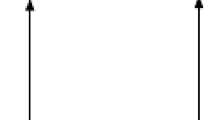Abstract
This article provides an overview of development of Kripke semantics for logics determined by information systems. The proposals are made to extend the standard Kripke structures to the structures based on information systems. The underlying logics are defined and problems of their axiomatization are discussed. Several open problems connected with the logics are formulated. Logical aspects of incompleteness of information provided by information systems are considered.
Similar content being viewed by others
References
R. Carnap,Meaning and Necessity, Chicago, 1974.
A. Church,A formulation of the logic of sense and denotation, In: P. Henle et al. (eds.),Structure, Method and Meaning, New York, 1951.
L. Farinas del Cerro andE. Orłowska,DAL — a logic for data analysis,Theoretical Computer Science 36 (1985), pp. 251–264.
G. Frege,Ueber sinn und bedeutung,Zeitschrift fuer Philosophische Kritik 100 (1892), pp. 25–50.
G. Gargov,Two completeness theorems in the logic for data analysis, ICS PAS Reports 581. 1986.
T. B. Iwiński,Algebraic approach to rough sets,Bulletin of the PAS, Mathematics 35 (1987), pp. 673–683.
D. Kaplan,Foundations of Intensional Logic, University of California, Los Angeles, 1964.
S. Kripke,Semantical analysis of modal logic I,Zeitschrift fuer Mathematische Logik und Grundlagen der Mathematik 9 (1963), pp. 67–96.
R. Montague,Pragmatics, In: R. Klibansky (ed.),Contemporary philosophy-la philosophie contemporaine. Florence, 1968.
J. Nieminen,Rough tolerance equality and tolerance black boxes,Fundamenta Informaticae 11 (1988), pp. 289–296.
E. Orłowska,Dynamic information systems,Fundamenta Informaticae 5 (1982), pp. 101–118.
E. Orłowska,Semantics of vague concepts, In: G. Dorn and P. Weingartner (eds.),Foundations of Logic and Linguistics. Problems and Solutions.Selected Contributions to the 7th International Congress of Logic, Methodology and Philosophy of Science, Salzburg, Plenum Press, New York, 1983, pp. 465–482.
E. Orłowska,Logic of nondeterministic information,Studia Logica XLIV (1985), pp. 93–102.
E. Orłowska,Logic for reasoning about knowledge,Zeitschrift fuer Mathematische Logik nd Grundlagen der Mathematik, to appear.
E. Orłowska,Kripke models with relative accessibility relations and their applications to inferences from incomplete information, In: G. Mirkowska and H. Rasiowa (eds.),Mathematical Problems in Computation Theory,Banach Center Publications 21, Polish Scientific Publishers, Warsaw, 1987, pp. 327–337.
E. Orłowska andZ. Pawlak,Representation of nondeterministic information,Theoretical Computer Science 29 (1984), pp. 27–39.
Z. Pawlak,Information systems-theoretical foundations,Information Systems 6 (1981), pp. 205–218.
Z. Pawlak,Rough sets,International Journal of Computer and Information Sciences 11 (1982), pp. 341–350.
J. Pomykała,Approximation operations in approximation space,Bulletin of the PAS, Mathematics 35 (1987), pp. 653–662.
V. R. Pratt,Application of modal logic to programming,Studia Logica XXXIX (1980), pp. 255–274.
D. Scott,An advice on modal logic, In: K. Lambert (ed.),Philosophical Problems in Logic: Some Recent Developments, Dordrecht, 1970, pp. 143–173.
K. Segerberg,Applying modal logic,Studia Logica XXXIX (1980), pp. 275–295.
D. Vakarelov,Abstract characterization of some knowledge representation systems and the logic NIL of nondeterministic information, In: D. Skordev (ed.),Mathematical Logic and applications.Proceedings of the 1986 Goedel Conference,Druzhba, Bulgaria, Plenum Press, New York, 1987.
D. Vakarelov,Modal logics for knowledge representation, to appear.
M. K. Valiev,Bazy dannych i wremiennaja logika,Naucznotechniczeskoje sowieszczenie ‘Logiko-algebraiczeskije modeli predstawlenia znanij’, 1983 (In Russian).
J. van Benthem,A Manual of Intensional Logic, Lecture Notes of the Center for the Study of Language and Information. Stanford University, 1985.
W. Żakowski,Approximations in the space (U, π),Demonstratio Mathematicae 16 (1983), pp. 761–769.
Author information
Authors and Affiliations
Rights and permissions
About this article
Cite this article
Orłowska, E. Kripke semantics for knowledge representation logics. Stud Logica 49, 255–272 (1990). https://doi.org/10.1007/BF00935602
Received:
Issue Date:
DOI: https://doi.org/10.1007/BF00935602




